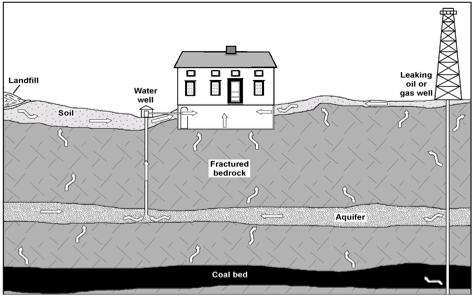Drilling and stray natural gas migration
From Wikimarcellus
Tcopley (Talk | contribs)
(movement of natural gas (mostly methane) through bedrock and soil)
Next diff →
Revision as of 22:45, 7 November 2012
Stray natural gas migration refers to the movement of natural gas (mostly methane) through bedrock and soil. It can leak from a variety of sources, including reservoir rock, coal seams, landfill, or pipelines. It can also occur from drilling any well--gas, oil or water. Whenever the water table is penetrated by a well, methane gas may be given an escape route. It moves from areas of high pressure to low.
Identifying Stray Gas
Stray gas is Quite common in regions of North America that are undergirded by hydrocarbon deposits, such as in southwestern and northeastern Pennsylvania. It can be found throughout the central and northern Appalachian Basin. When it occurs, it can be broken down into three main categories:
- Sub-surface microbial gas. These originate in deep sea sediments and may be identified as drift gas.
- Near-surface microbial gas often from landfills or naturally occurring marsh gas.
- Thermogenic gas consisting of natural gas or coal-bed gas.
These gasses can blend together into a mixture of gases.


